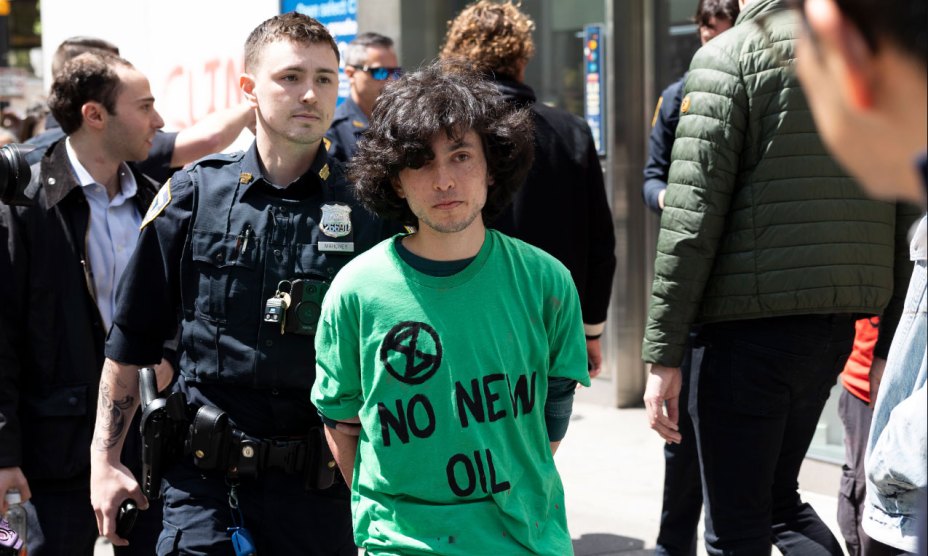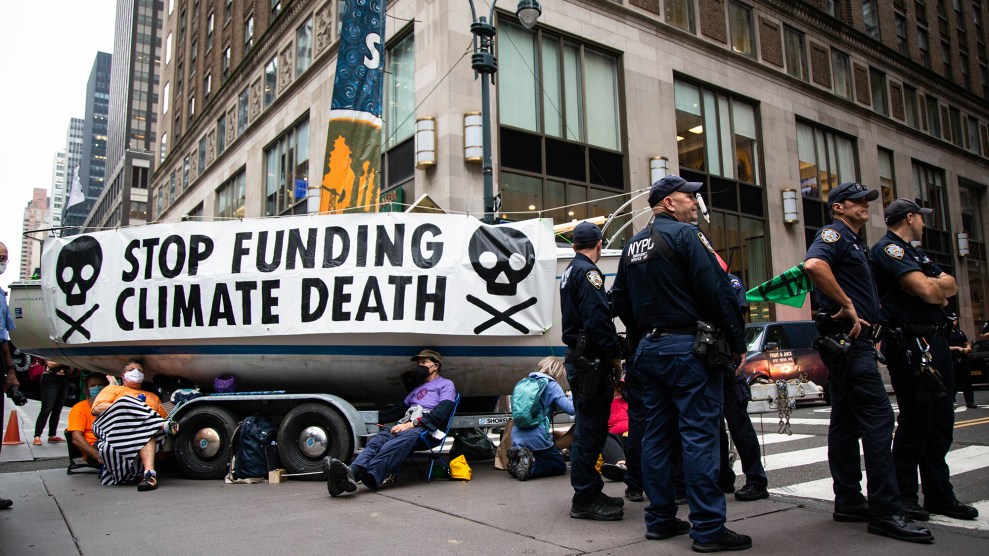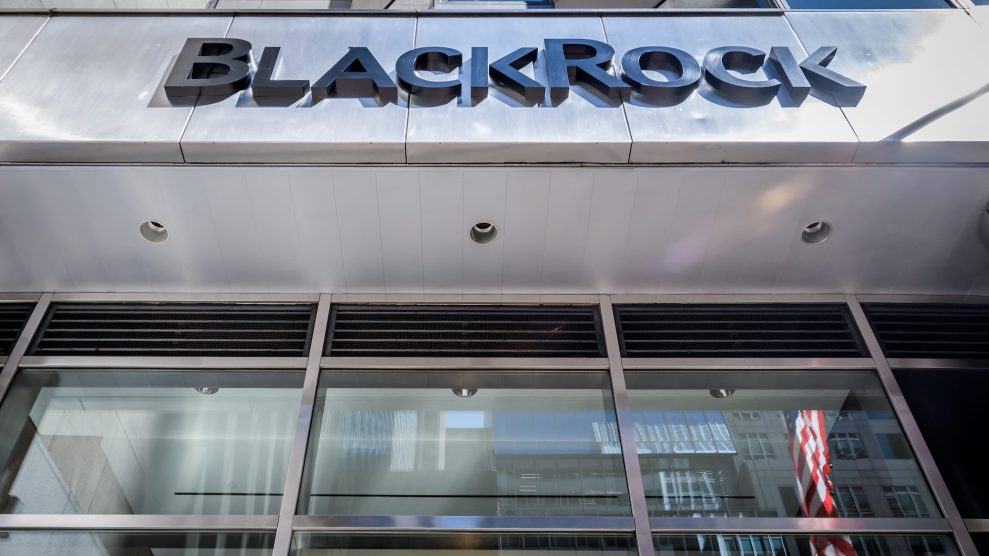
An Extinction Rebellion protester is arrested in front of Citibank's Manhattan headquarters on April 24.Gina M. Randazzo/Zuma
This story was originally published by the Guardian as part of our Climate Desk collaboration.
As they exited their office in Tribeca on Monday afternoon, Citibank employees were confronted with a boisterous crowd chanting and dancing along to the music of a mariachi band.
It was a funny sight: New York banking professionals in black and gray business attire coming face to face with a loud, colorful group on a mission to engage in a conversation about the climate crisis.
One woman dressed as a sunflower attempted to approach a Citibank employee, but her efforts were in vain. Some waved off invitations to take a flyer or walked past the protesters, ignoring them altogether.
Climate activists swarmed parts of New York and San Francisco on Monday afternoon, demanding that banks enact actionable climate resolutions on the eve of their annual shareholders meetings—when crucial decisions about fossil fuel funding are made.
Standing outside Citi’s New York headquarters was Siuli Gowilt, who belongs to Third Act, a group of protesters over the age 60 using their leverage with financial companies. “As retirees, we have a lot of money in places like Citibank, Fidelity, Vanguard, Chase and Wells Fargo, and they’re using our money to fund new fossil fuel projects. We’re asking them to stop it.”
Earlier on Monday in a linked action, activists protested outside a Wells Fargo in San Francisco.
The latest report last week from Banking on Climate Chaos, an organization that tracks bank financing for companies in the fossil fuel industry, found that US banks had loaned over $4.6 trillion to the fossil fuel industry since 2016, the year the Paris climate agreement was struck.
The report says Citi, JP Morgan, Wells Fargo, and Bank of America are the worst offenders, contributing a combined $1.3 trillion to fossil fuel companies such as ExxonMobil, Shell, Chevron or ConocoPhillips by financing their projects.
Scrutiny of ongoing financing of fossil fuel projects comes after promises made by many of these banks to cut back on fossil fuel funding. Wells Fargo’s website says: “Climate change is one of the most urgent environmental and social issues of our time. Wells Fargo is committed to aligning our activities to support the goals of the Paris Agreement and helping transition to a net-zero carbon economy.”
Citi has taken pains to establish its image as a climate-conscious financial organization. A Citi representative told the Guardian: “Citi recognizes the importance of transitioning to a low-carbon economy. That’s why we’re investing in clean energy solutions through our net zero commitments and our $1tn commitment to sustainable finance, while working with all our clients, including our fossil fuel clients, to support their efforts to decarbonize their businesses. Our approach reflects the need to transition while also continuing to meet global energy needs.”
A 2022 Citibank “Taskforce on Climate-related Financial Disclosures” report said: “Citi has committed to achieving net zero emissions associated with our financing activities by 2050, and net zero emissions for our operations by 2030.”
In a public letter published in January 2022, Citi Bank’s CEO, Jane Fraser, wrote: “We know it is not enough to say Citi is committed to tackling climate change. That’s the easy part. As the world’s most global bank, we can help drive the transition to a net zero economy and make good on the promise of the Paris agreement.”
But activists like those outside Citibank’s headquarters in New York say these banks are engaging in “greenwashing,” or marketing themselves as pro-climate when their actions say otherwise. Citibank is the world’s second biggest fossil fuel funder—JPMorgan Chase leads the way—according to the Banking on Climate Chaos report, pumping $333 billion into the sector since the Paris climate agreement.
Members of Extinction Rebellion were arrested in New York on Monday afternoon for spray-painting phrases such as “Climate Criminals” on the windows of Citibank’s office.
Mark Graham, an Extinction Rebellion member since 2019, is a former Citigroup employee, where he worked as a managing director for 15 years. Now, he finds himself on the outside of the towering building. “It is the financial companies which are at the intersection of funding climate chaos. It is the pressure point that we can work. We’re hoping to get the employees to realize they have power,” he said. “The question is: Are you doing enough? The answer is no. We have to change radically.”












